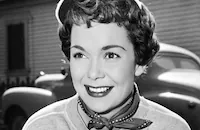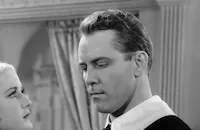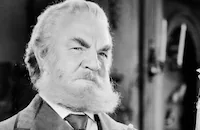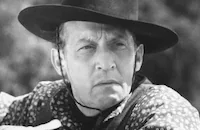Public Wedding

Brief Synopsis
Cast & Crew
Nick Grinde
Jane Wyman
William Hopper
Dick Purcell
Marie Wilson
Berton Churchill
Film Details
Technical Specs

Synopsis
Pop Lane, his daughter Flip and several cronies run an unsuccessful concession at an amusement park. To attract customers, they decide to hold a public wedding in the mouth of the whale skeleton that they display. Flip is to be the phony bride and her phony groom is also one of the group. When he and another of the crew decamp with the money from the admissions, Flip finds herself groomless. Facing an angry crowd, eager for their money's worth, Pop drafts artist Tony Burke as a stand-in. To their surprise, the judge that performs the ceremony turns out to be a real judge, and Flip and Tony find themselves actually married. Flip is so angry, she walks out on Pop, impressing Tony, who follows her. He brings her to his studio above a stable, closely followed Pop and the sole remaining member of his crew, Joe Taylor. After Flip and Tony send them out to fend for themselves, Pop and Joe decide to ask stripper Tessie for a loan. They arrive just in time to rescue Tessie from a police raid, offering her Flip's disgarded wedding dress for clothes. The wedding dress gives Pop an idea for another con. Tessie pretends to be a bride who attempts suicide after supposedly being left at the altar. Meanwhile, Flip has been trying to sell Tony's paintings without luck. Seeing an article about the suicidal bride, she resolves to boost Tony's reputation by presenting him as the man responsible for Tessie's suicide attempt. Suddenly society women are clammering for portraits by Tony, but nothing is happening for Pop, Joe and Tessie. Because Flip took advantage of their set-up, Pop visits the studio to demand that she cut them in on the profits. When Tony learns about Flip's manipulation, he is furious. Realizing that they love each other, however, he eventually agrees to stay if Flip will let him be the boss. After she accepts, Tony offers Pop money on condition they all leave for Florida and stay there. Although he seems agreeable, Pop actually has a scheme to increase their profits. Using Tony's check as encouragement, he raises money from society people, who believe they are donating to a school for young artists. Flip discovers the con just after they have withdrawn the entire account from the bank. Tony is arrested for obtaining money on false pretenses, and Flip pursues Pop, Joe and Tessie to the airport. She convinces Pop that the money is traceable and he will be arrested as soon as he tries to use it. Once she gets the money back, she gives him a small sum so that he can leave town to avoid arrest. She then redeposits the money in a trust fund to be used to benefit young artists, and shows the police the deposit slip to gain Tony's release. Together again, Flip and Tony sail to Europe for a belated honeymoon.

Director
Nick Grinde
Cast

Jane Wyman
William Hopper

Dick Purcell

Marie Wilson

Berton Churchill
James Robbins

Raymond Hatton

Veda Ann Borg
Zeni Vatori
Jimmy Foxe
Curtis Karpe
Carlyle Moore Jr.
Horace Macmahon
John Harron

Jack Mower
Lyle Moraine
Crew
Houston Branch
Houston Branch
Roy Chanslor
Elmer Decker
Frank Dewar
Drew Eberson
Bryan Foy
Reggie Hammerstein
Esdras Hartley
L. Wm. O'connell
John Pearson
Jack L. Warner

Videos
Trailer
Hosted Intro
Film Details
Technical Specs

Articles
Public Wedding
That said, Public Wedding, a rollicking comedy about the payoffs and perils of publicity, is lively, fast-paced and highly entertaining, and the two leads are charming and capable. Wyman is Flip, running a failed carnival with her father and a couple of con men. To attract customers, they stage a phony wedding in the mouth of a giant stuffed whale, with Flip as the bride. To everyone's surprise, the "minister" is actually a clergyman, and Flip finds herself married to the artist reluctantly drafted to play the groom. Comic complications abound before all ends happily for the young lovers.
By the time Wyman appeared in Public Wedding, she had been under contract with Warner Bros. for about a year, and the former Sarah Jane Mayfield had begun using the name Jane Wyman professionally. After five years of bit parts, she was working steadily and films like Public Wedding highlighted her gift for comedy. In the postwar years, Wyman proved her versatility with a series of dramatic roles finally winning an Oscar® for her performance as a deaf-mute woman in 1948's Johnny Belinda.
Hopper, whose late father was stage star DeWolf Hopper, had been signed to a contract at Paramount in 1936, but only had bit parts there. Moving to Warner Bros. the following year, his prospects improved, and he began playing leads in "B" features. That same year, his mother Hedda, whose own minor film career had languished, found her true calling when she began writing her Hollywood column. After service in World War II, Bill Hopper, a reluctant actor, worked in auto sales for several years until he returned to the screen in the mid-1950s at the urging of director William Wellman, in a small role in Wellman's The High and the Mighty. Finally, comfortable as an actor, Hopper had roles in other prestige films such as Natalie Wood's father in Rebel Without a Cause and played investigator Paul Drake in the long-running television series Perry Mason in the 1950s and 1960s.
Marie Wilson began her film career in the mid-1930s and specialized in "ditsy blonde" roles, such as the one she plays in Public Wedding. But it wasn't until the late 1940s that she found her biggest success in radio, and later on television, as My Friend Irma. In Public Wedding, Wilson leads a wonderfully familiar cast of supporting players. You may not recognize their names--Berton Churchill, Dick Purcell and the epitome of "cheap blonde" bimbos, the delightfully-named Veda Ann Borg--but you will recognize their faces.
Director: Nick Grinde
Screenplay: Roy Chanslor, Houston Branch
Cinematography: L. William O'Connell
Editor: Frank Dewar
Art Direction: Esdras Hartley
Principal Cast: Jane Wyman (Flip Lane), William Hopper (Tony Burke), Dick Purcell (Joe Taylor), Marie Wilson (Tessie), Berton Churchill (Pop Lane), James Robbins (Nick), Raymond Hatton (the Deacon), Veda Ann Borg (Bernice)
61 minutes
by Margarita Landazuri

Public Wedding
Quotes
Trivia
Notes
According to Hollywood Reporter, Donald Woods was assigned to this film, but was removed to replace Craig Reynolds in Talent Scout. Hollywood Reporter notes that this was the first major screen role of William Hopper, son of gossip columnist Hedda Hopper. Contemporary sources alternately name Elmer Decker and Drew Eberson as assistant director.
















